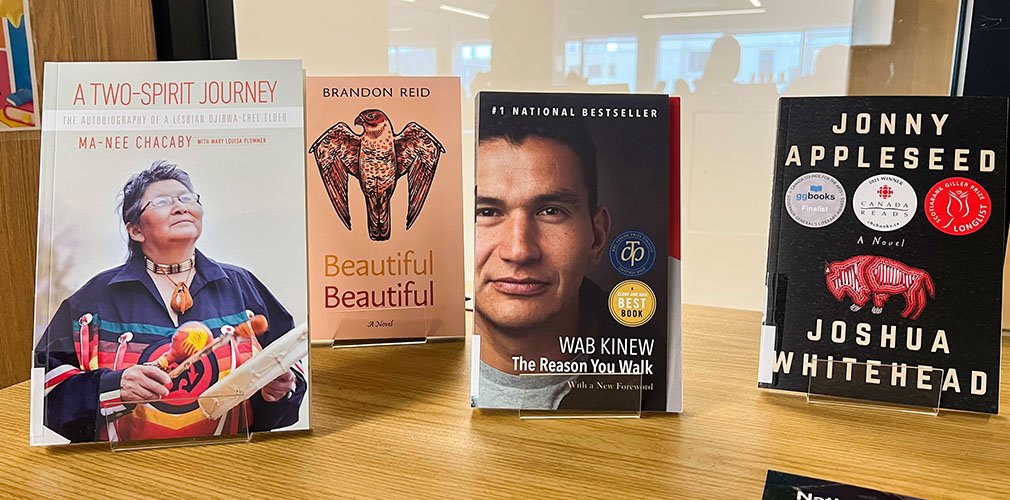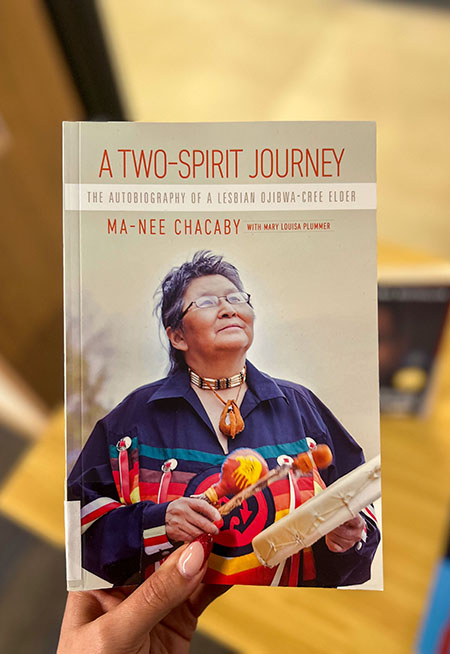

”Education got us into this mess and education will get us out of it.”
National Indigenous Peoples Day is celebrated each year on June 21st. It was first celebrated in 1996 when Governor General Roméo LeBlanc proclaimed it. As students of Alexander College, we at the Library invite you to think about the above quote.
What does it mean to you? To us, it is recognition that, in the past, our education system taught that settlers were superior to Indigenous peoples, and that they had the right to take over the land we now call Canada.
This education led to the horrors of the Residential School system, as well as systemic racism as seen in, for example, the refusal of allowing Indigenous people to freely vote until 1960, or the infamous “60s Scoop.” People were taught that such things were acceptable, so they went along with it.
Now, with the passage of time and with the resilient efforts of Indigenous people reclaiming their rights, we can start to move away from the mistakes and atrocities of the past. This is what this commemorative day is about: starting and empowering new education so that we can get out of the “mess” of historic and systemic racism against Indigenous peoples.

Canada’s Indigenous peoples include the First Nations, Inuit, and Métis. The term “First Nations” is used to refer to Indigenous folks that are neither Metis nor Inuit. The phrase itself encompasses over 634 recognized communities across Canada. In the entire country itself, over 1.8 million people self-identified as Indigenous during the 2021 census.
In British Columbia alone, there are over 203 Indigenous communities. Alexander College itself is situated on the unceded territories of the Coast Salish peoples, including the territories of the xʷməθkʌwə̇y̓əm (Musqueam), Skwxwú7mesh (Squamish), and Səḷílwətaʔ/Selilwitulh (Tsleil-Waututh) Nations.
Want to learn more about the land on which you reside? Check out this interactive map from Native Land.
Remembering that the theme of this day is new education. How can you educate yourself, as an international student? For one, you can take some of our excellent courses on Indigenous peoples, including History and Sociology.

Alexander College is committed to decolonialization. Decolonization refers to undoing the effects of colonialism. Colonialism is when a country overtakes another country and claims its lands, resources, and peoples as its own property. This is what happened when the British and French colonizers took over the lands that we now call Canada.
At Alexander College, decoloniality means using education to dismantle the legacies of colonialism. We can do this with something as subtle as a land acknowledgment, by considering new teaching methods and practices in the classroom, such as the medicine wheel, or by asking questions of our Lecturers, Professors, and Librarians, to learn more about Indigenization and decolonial work.
Most importantly, we can ask ourselves how we can all contribute towards reconciliation. We can also pursue decoloniality by centering Indigenous voices and knowledge. For example, you might choose to do an assignment on an Indigenous leader and include their words and knowledge in your own work.
Alexander College Library believes in Indigenization, which is the promoting of Indigenous voices, knowledge, and perspectives. Our Team has been hard at work ensuring that our students have high quality resources about Indigenous peoples, and (most importantly) by Indigenous peoples.
We also support Indigenous business by working with Strong Nations, which is an Indigenous-owned and operated company that sells Indigenous-themed materials made and published by Indigenous peoples. You can learn more about them here: https://www.strongnations.com/.
Please visit our Indigenous Studies Research Guide here: https://alexandercollege.ca/student-support/library/research-help/indigenous-studies/. At this link, you can find

Need help with finding Indigenous resources for your research assignment? Make an appointment in-person or online through WCOnline here: https://alexander.mywconline.com/.
So, on this important day, June 21, 2025, remember the late Justice Murray Sinclair’s words: that anti-Indigenous racism was once learned, and through new education, it can be unlearned. And in its place, we can work individually and collectively to learn from and uplift Indigenous voices, knowledge, and perspectives!
Alexander College acknowledges that the land on which we usually gather is the traditional, ancestral and unceded territory of the Coast Salish peoples, including the territories of the xʷməθkwəy̓əm (Musqueam), Skwxwú7mesh (Squamish), and Səl̓ílwətaʔ/Selilwitulh (Tsleil-Waututh) Nations. We are grateful to have the opportunity to work in this territory.
Alexander College acknowledges that the land on which we usually gather is the traditional, ancestral and unceded territory of the Coast Salish peoples, including the territories of the xʷməθkwəy̓əm (Musqueam), Skwxwú7mesh (Squamish), and Səl̓ílwətaʔ/Selilwitulh (Tsleil-Waututh) Nations. We are grateful to have the opportunity to work in this territory.